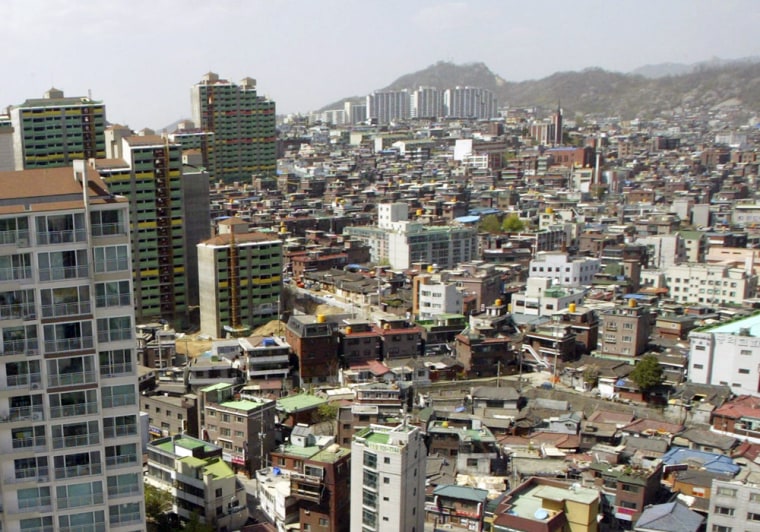Peter Oh, a Seattle real estate agent, is planning to open a showroom to market 21 condominium buildings in the Puget Sound region. But he’s not looking for a storefront location in downtown Seattle, nor is he planning to locate among the many new high-rises in nearby Bellevue across the lake.
Instead, he’s creating a marketing office 5,000 miles away — in South Korea.
“My competition already sold one-third of a building out of a mini-sales center in South Korea,” Oh says, referring to marketing efforts by Shin Young, a developer selling a 334-unit Los Angeles condo building, The Residences @ Bixel.
Oh’s showroom could open as soon as October — not a moment too soon. Oh, of the agency Urban Condominiums, says South Koreans have a pent-up demand for overseas homes, and a particular affinity for real estate in big American cities. Oh already has sold South Koreans 14 homes in The Bravern, a 455-unit luxury tower under construction in Bellevue and expects further response.
South Koreans are benefiting from new, more liberal foreign investment laws back home, but the country isn’t the only new market on agents’ radars, especially not for luxury projects. Jason Press, executive vice president of marketing at New York-based condo marketing company Shvo, has traveled to Seoul, Paris and elsewhere to peddle the company's high-end offerings.
“We recently launched a new office in Dubai, and that’s spurred interest from that region in New York City,” Press says. “We’re associated with luxury international brands, and these are magnets to international buyers.”
Declining prices and a weak dollar have made U.S. property more appealing to overseas buyers, while a weak U.S. economy has forced real estate agents to look farther afield for buyers.
Last year one-third of American agents worked with at least one international buyer, according to the National Association of Realtors. The top five countries supplying international customers were Mexico, Britain, Canada, India and China.
In Dallas, where a $400 million downtown revitalization effort is sprucing up downtown and creating a new arts district, developers of the forthcoming 120-unit Museum Tower luxury condo building are pitching Mexico’s elite. Units in the new tower start at $1 million.
“We’re going to actively market Museum Tower in Monterrey and Mexico City,” says Dan Boeckman, a partner at Turtle Creek Holdings, co-developer of the project with Brook Partners. Boeckman says his firm will not only make presentations in Mexico but also sponsor events likely to attract an elite audience, such as fashion shows.
“We think there should be some European interest, too," he says. "We’re thinking about how to go about it.”
Canadians, meanwhile, are taking advantage of the exchange rate, which gives their dollar — the “loonie” — the kind of leverage it hasn’t seen in years. Five years ago, the Canadian dollar was worth about 70 cents in U.S. currency; now it's worth about $1.01.
Mark Dziedzic, president of property marketer Arizona for Canadians, moved to the Phoenix area three years ago from Canada and now markets property in Phoenix, Scottsdale and Sedona to Canadians.
Outside the Kihei Akahi condo complex on the Hawaiian island of Maui, three flags fly: American, Hawaiian and Canadian. Randy Antonio, an agent with Keller Williams in Maui, says that’s because so many Canadians have bought into the complex, where condos sell in the $500,000 range.
Canadians have been interested in Hawaii since the 1970s, Antonio says, but in recent years the favorable exchange rate has finally made it more affordable for many to buy. Since last year many of his open houses have seen 90 percent Canadian attendance.
Dean Jones, president of Seattle condo marketing agency Realogics, has partnered with Oh, the Urban Condominiums agent, to pitch Seattle-area property to Canadians. Oh got 22 reservations from Canadians during the pre-sale phase of a 39-story condo tower in downtown Seattle after a trip in December.
Jones said some builders are even offering “currency hedges” to Canadians so they can lock in their final purchase at current exchange rates. Dziedzic says some builders in Arizona are using the same strategy.
“Canadians have an opportunity they’ve never seen before,” Dziedzic says.
Agents, of course, have the opportunity too — and as showrooms pop up in Dubai and Seoul, and road shows hit Monterrey and Paris, Americans can expect to see their urban real estate go increasingly global.
